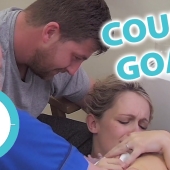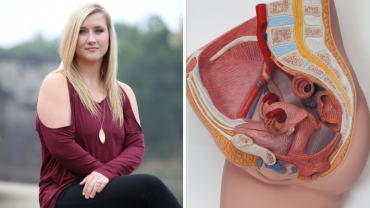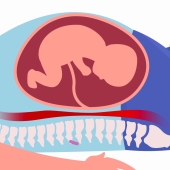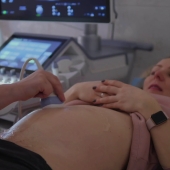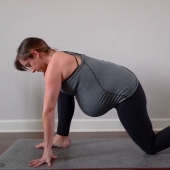Labor Position: Sitting - When you feel baby's weight bearing down, you may just want to sit. This labor position can relieve some of the pressure on your pelvis.
Pros:
• Good for resting
• Relaxes the perineum, which can reduce tearing.
Cons:
• May not be an option if you've had high blood pressure during pregnancy.
Labor Position: Upright - Make gravity work to your advantage. Being vertical can get you closer to the finish line.
Pros:
• Relieves backaches
• Can make contractions less painful.
Cons:
• Not recommended for women with high blood pressure.
Labor Position: Hands and Knees - This calls for you to get down onto your hands and knees.
Pros:
• Takes pressure off the spine
• May help boost baby's oxygen level.
Cons:
• Your arms may get tried.
Labor Position: Lying On Your Side - One of the best positions to try when you need a rest. It can actually help baby descend and rotate.
Pros:
• Helps get oxygen to baby.
• Can be used if you have high blood pressure.
Cons:
• May be difficult to assesss fetal heartbeat.
Labor Position: Lunging - Put your foot up on a chair for these lunges and lean your body forward onto the raised foot when a contraction comes on.
Pros:
• Helps baby rotate or descend.
• Opens the pelvis, giving baby more room.
Cons:
• Requires a partner to help you keep balance.
Labor Position: Squatting - Can be done against a wall or with the support of a chair or partner.
Pros:
• Helps open the pelvis
• Gives baby room to maneuver as he heads toward the birth canal.
Cons:
• May become tiring
Labor Position: Stair Climbing - Baby might need extra encouragement to slip into the optimal position.
Pros:
• Allows baby to drop farther and push on the cervix.
Cons:
• Can be tiring, especially if you've been in labor for a while.
Labor Position: Birthing Ball - You can sit or rock on it, lean against it or simply drape your upper body over it while kneeling.
Pros:
• Relieves back pressure
• Can help encourage dilation and move baby deeper into the pelvis.
Cons:
• Can be difficult to keep your balance or do alone.
- 4787 views

